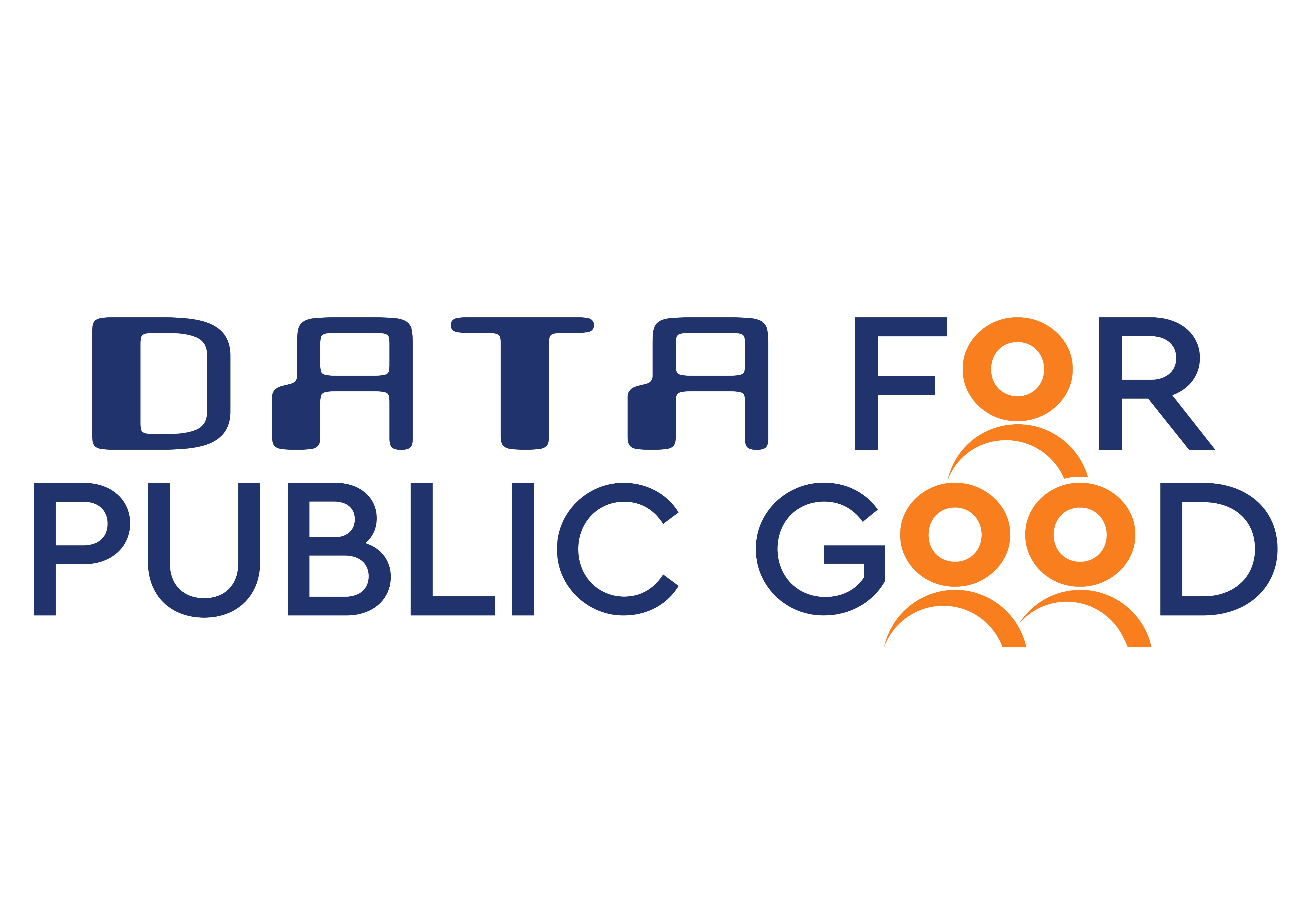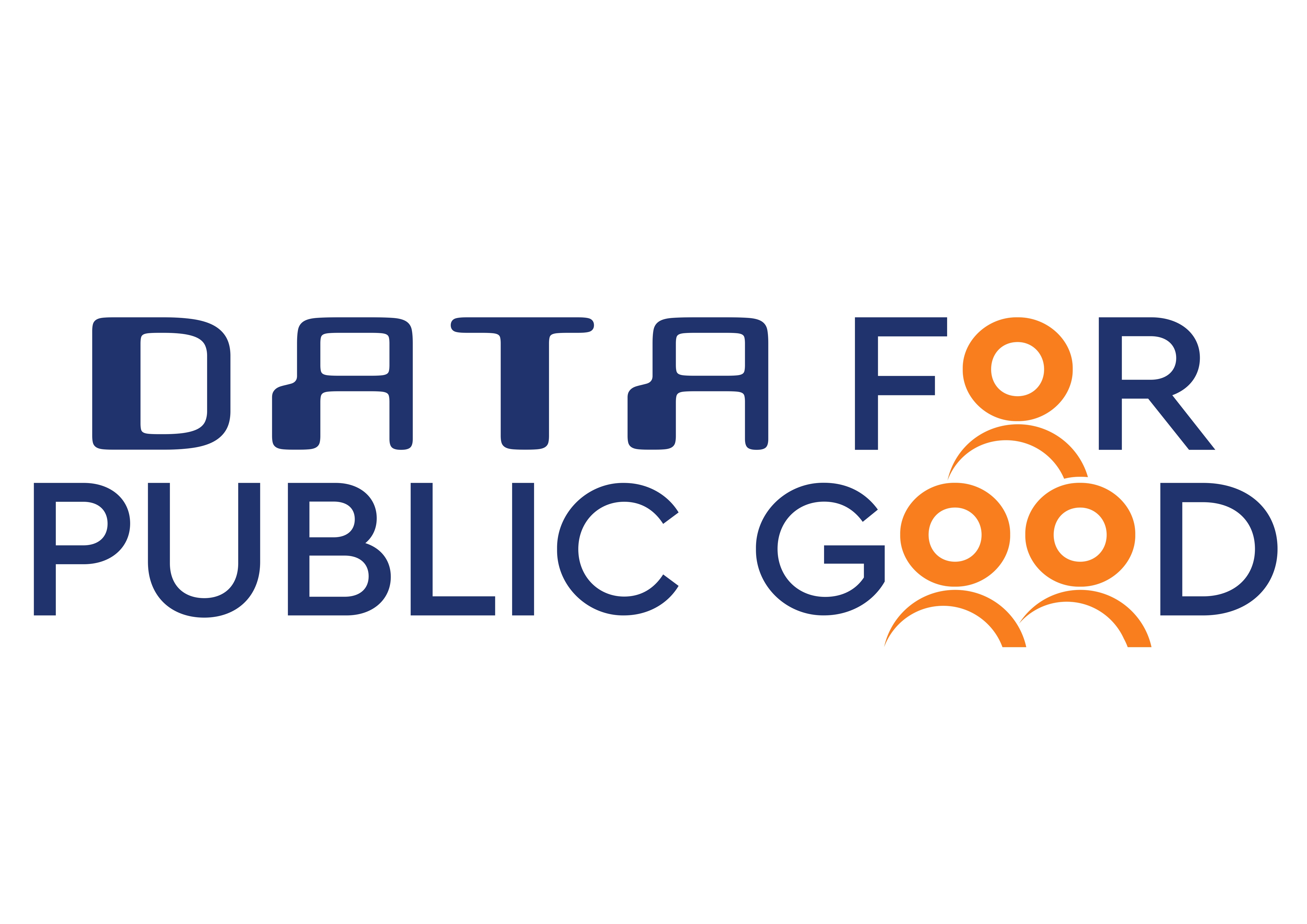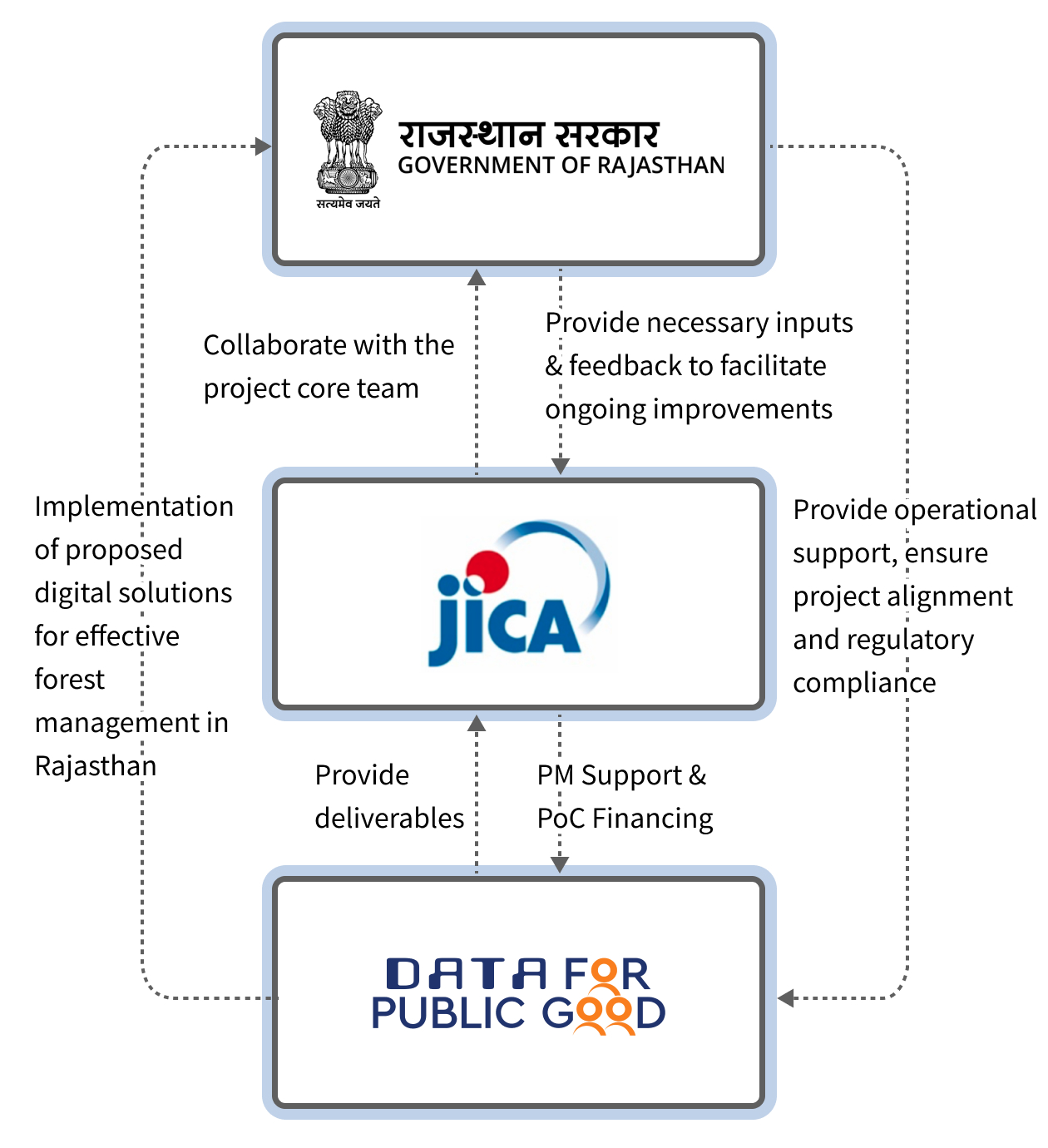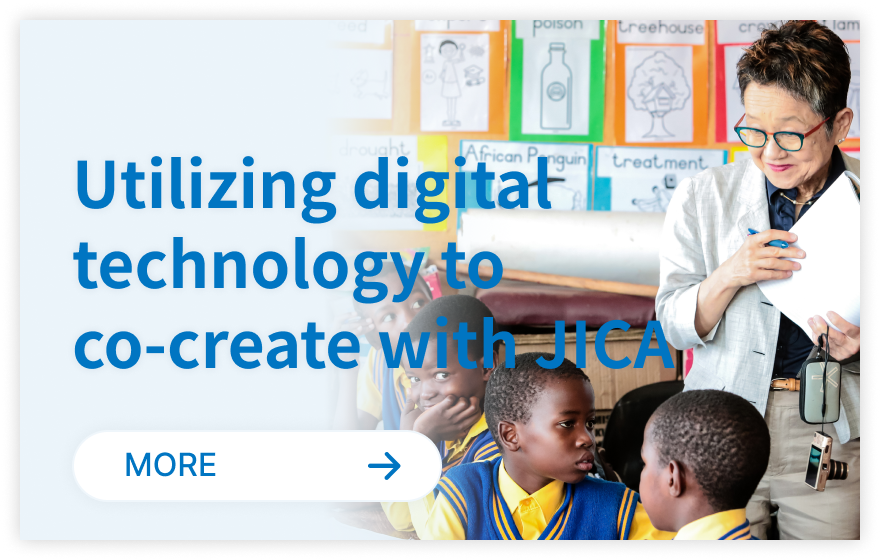Summary
Details of Implementation
This Request for Proposal (RFP) represents a collaborative initiative between JICA DX Lab and the Rajasthan Forest Department (RFD) to identify a Digital Partner for building the Forest Stack Data Exchange Platform. Building upon learnings from the DigiVan applications (monitoring and planning) - which leveraged satellite imagery (NDVI, canopy density) and MIS data to enhance forest management - this platform will unify diverse forestry-related datasets under a layered, open architecture.
Digital Partner

Key Aspects:
・Data Ingestion & MDM: Multiple sources (NASA, ISRO, IMD, DigiVan, FMDSS, local MIS) are integrated via secure ETL pipelines. A Master Data Management (MDM) approach ensures consistent references for region codes, species IDs, and forest produce categories.
・Standardized APIs & Partially Open-Source Scripts: The platform provides well-documented APIs (REST/GraphQL) and re-usable geospatial code snippets (NDVI, canopy masking). External developers can request new data endpoints or contribute improvements, aligning with Digital Public Infrastructure (DPI) principles.
・Consent & Governance: A robust mechanism ensures restricted usage, or sensitive data sets require disclaimers; usage is tracked via rate limits, user roles, and activity logs. An admin portal oversees user registrations and disclaimers, ensuring compliance with local/international rules.
・Innovation-Friendly Architecture: Containerized microservices (Node/Python) remain offline-friendly, letting hackathon participants or NGOs propose expansions (carbon credit facilitation, biodiversity indexing). This design potentially meets digital public good (DPG) standards, paving the way for replication and global best practices.
Ultimately, this initiative seeks to empower RFD with actionable insights, unify data sharing for advanced forestry analytics, and lay a foundation for broader environmental solutions-ranging from eco-tourism planning to climate resilience modeling-in Rajasthan and beyond.
Timeline
The platform’s initial development is scheduled for 5 months, beginning May 2025 and concluding September 2025. By June 20, an MVP (developer onboarding, partial open-source snippet usage, MDM references, disclaimers) must be operational. The remaining duration focuses on implementation of the rest of the features post MVP, final refinements, scalability improvements, and advanced use-case integrations.
Status


Index
Project Context
Rajasthan, India’s largest state, encompasses arid deserts in its western regions and forested, hilly terrains in the east. With roughly 9.6% forest cover, these woodlands are crucial for ecosystem services, climate resilience, and local socio-economic stability. However, persistent challenges such as desertification, climate variability highlights the need for more data-driven forest governance.
Japan International Cooperation Agency (JICA) has long provided support to Rajasthan’s forestry initiatives, financing various afforestation, biodiversity, and rural development projects over the past two decades. To further modernize forest management through digital means, JICA and the Rajasthan Forest Department (RFD) collaborated to launch DigiVan—a unified system that combines two key use-cases enabling Forest Monitoring and Planning. DigiVan demonstrated how consolidated, analytics-driven data can empower on-ground teams and inform strategic decisions at senior levels. Building on these foundational lessons, RFD and JICA aim to scale digital forestry efforts beyond just two use-cases.
Accordingly, they are introducing the Forest Stack Data Exchange Platform-a layered, scalable solution envisioned as a Digital Public Infrastructure (DPI) that can collect, transform, and expose a variety of forestry and environmental datasets (satellite imagery, weather, socio-economic factors) through standardized APIs. Key differentiators include a robust Master Data Management (MDM) system for consistent region/species references, partial open-source geospatial scripts (NDVI, forest masks) for community co-creation, and consent-based governance ensuring restricted data usage is properly regulated. By leveraging these enhanced capabilities, the platform not only addresses RFD’s immediate data needs but also provides a future-ready framework for hackathons, third-party integrations, and advanced expansions-like carbon-offset modeling or biodiversity mapping-spanning Rajasthan’s diverse ecological landscapes, and potentially replicable across other states.
Join us in this transformative journey to bring the Rajasthan Forest Department’s data exchange ecosystem to new heights of excellence and sustainability. By working together, we can create a lasting impact, strengthen sustainable forest governance, and empower RFD to harness cutting-edge digital capabilities-ensuring healthier forests and vibrant communities for generations to come.
RELATED MATERIALS
Project members
Digital Partner

Center of Data for Public Good, Foundation for Science Innovation and Development (CDPG, FSID)
Key Features of CDPG’s Data Exchange being built for Rajasthan Forest Department:
・Secure & Seamless Access
・Easy sign-up/sign-in process with password-based login
・Email verification during registration and two-factor authentication (OTP) for enhanced security
・Effortless Dataset Browsing & API Access
・Discover and explore a curated library of public and private datasets
・Each user receives a unique Client ID & Secret for secure API access
・Simple token-based API access to query datasets using dataset IDs
・Controlled Access to Premium Data
・Public datasets available instantly
・Request access to private datasets; demonstrate your interest, and await producer approval
・Comprehensive Consent Management
・One-time consent on registration for general resource use
・Dataset-specific permissions requested when accessing private datasets
・In-App Resource and Code Library
・Access to BI scripts and algorithms used by DigiVan within the platform
・A managed GitHub repository enables collaboration and exploration of data-driven solutions
・Rich and Evolving Dataset Catalogue
・Includes both migrated core DigiVan datasets and a growing selection of open-source datasets
・Expanding library to encompass all current DigiVan data and additional public datasets
・Integrated Data Quality Controls
・Master Data Management (MDM) ensures accurate and consistent data ingestion and storage
・Smart, Derivative Data Insights
・Generate intelligent, combined datasets through an integrated analytics layer
・API endpoints available for both raw and derived data
・User-Friendly Documentation
・Complete user manual guides you through registration, browsing, API usage, and consent processes
・Detailed developer documentation (via Redocly) makes API consumption seamless
・Showcased Use Cases
・Browse real-world application examples to inspire your projects
・Gain insight into how others are leveraging platform datasets
・Innovation Challenge Hub
・Participate in or follow innovation challenges and hackathons
・Discover winning projects, guidelines, and opportunities to request additional data
・Fair & Consistent API Usage
・API rate limiting ensures reliable access and equitable usage across the user community
・Platform Analytics Dashboard (Coming Soon)
・See key metrics like daily/monthly active users, API call trends, and dataset popularity
・Understand how the platform is used and performing
・Collaborative Development Environment
・Contribute to shared BI code and algorithms
・Engage in community-driven improvements through pull requests and code reviews
Dr. Inder S Gopal
Chairperson, Centre of Data for Public Good, Foundation for Science, Innovation and Development
The Centre of Data for Public Good (CDPG) at FSID, IISc Bengaluru, is honoured to collaborate with JICA DX Lab as the Digital Partner for the development of the Forest Stack Data Exchange for the Rajasthan Forest Department. This pioneering initiative builds on CDPG’s proven track record of creating scalable, open-source data ecosystems across critical domains such as urban governance, agriculture, geospatial, and healthcare.
The Forest Stack represents a major leap forward - designed to consolidate and activate forestry-related data to power smarter decisions, enhance ecological resilience, and empower local communities. By enabling secure, interoperable exchange of high-value datasets—from satellite imagery and biodiversity indices to climate metrics and operational logs—the platform will embed principles of governance, openness, and consent at its core.
By transforming forestry data into a strategic public asset, the Forest Stack will drive better planning, foster transparency, and support sustainable forest management in Rajasthan.
This digital public infrastructure for forestry will not only elevate data into a strategic asset for sustainable forest management in Rajasthan, but also set a replicable blueprint for regions across India and the world. We’re excited to co-create this innovative ecosystem with the Rajasthan Forest Department, JICA, and other forward-thinking partners.

Project Owner
Mr. K.C.A. Arun Prasad
PD-CRESEP
, Rajasthan Forest Department
Rajasthan Forest Department proudly spearheads this Data Exchange Platform initiative in collaboration with JICA. By unifying forestry data through secure APIs and partial open-source references, we seek to build a future-ready digital ecosystem. This effort underlines our dedication to sustainable forest management and aims to uplift local community livelihoods via open data, advanced analytics, and broader environmental use cases.

Sponsor
Saya Ishikawa
Representative of JICA India Office
The Japan International Cooperation Agency (JICA) has a longstanding commitment to forestry development in Rajasthan. With the Forest Stack Data Exchange Platform, JICA and RFD plan to accelerate digital transformation by centralizing diverse data sets and scripts into one scalable architecture. Beyond providing strategic oversight and technical support, JICA DX Lab guides the project toward local alignment and international best practices in digital innovation. This initiative underscores JICA’s wider mission of fostering sustainable development and innovation in partner regions, further empowering RFD for modern forest governance.

Partner Relationship

PoC Implementation Requirements
Eligibility (excerpts)
Prospective bidders (hereafter “Digital Partners”) must demonstrate both the technical capabilities and the organizational acumen necessary to design, develop, and deploy the Forest Stack Data Exchange Platform, aligning with the project’s DPI/DPG goals and Rajasthan’s forestry needs.
The selection process has defined eligibility criteria to ensure only qualified candidates proceed. This is followed by a technical evaluation and interview, where eligible bidders present their proposals. Post-presentation, technical marks are awarded based on the assessment of the proposals. Subsequently, commercial bid opening occurs, determining the highest scorer based on combined technical and commercial evaluations. This structured approach ensures a transparent and merit-based selection of the most suitable bidder.
Criteria for selection process:
1. Organization Capacity
- The management members of the Digital Partner (and all management members in case of consortium bidders) do not include individuals with a history of corruption, arrest records, or affiliations with criminal organizations.
- The bidders must have minimum annual revenue of USD 0.5 Mn in the past 2 fiscal years. For consortium bidders, the lead bidder must satisfy this criterion.
- The bidders must have a minimum of 30 FTEs. For consortium bidders, the lead member must have a minimum of 30 FTEs, while each consortium member must have a minimum of 15 FTEs.
2. Data Exchange & API
- Skilled in microservices-based architectures with secure APIs (REST/GraphQL), developer portals, and usage analytics.
3. MDM & Data Governance
- Experience unifying region codes, species IDs, or produce categories (resolving synonyms/duplicates).
- Can implement data validation, quarantining unknown references.
4. Security & Consent
- Expertise enforcing disclaimers (restricted data), OAuth2/JWT, encryption (AES-256, TLS 1.3), and logs for compliance.
5. Geospatial & Remote Sensing
- Comfort with NDVI, canopy density, advanced raster processing (GDAL, PostGIS), partial open-source scripts, and offline scenarios.
6. Offline Deployment & Scalability
- Proficient in container-based (Docker/Podman) setups (no external fetch calls).
- Able to scale microservices (Infra-as-Code, concurrency surges).
7. Proven Delivery & Timeline
- Must show government/enterprise references or partial open-source libraries.
- Able to produce an MVP by June 30 (basic dev portal, MDM references, disclaimers).
8. Team Composition & Communication
- Balanced team (GIS, data engineering, security, PM).
- Willingness for proactive comms (weekly scrums, monthly steering committee) and hackathon collaborations.
Primary scope of work
Data Ingestion & MDM Enforcement
ETL Pipelines
Set up or adapt existing Airflow (or equivalent) jobs to pull data from NASA, ISRO, IMD, FMDSS, and local MIS.
Master Data Management (MDM)
Implement a unified referencing system for region codes, species IDs, produce categories, etc. Unrecognized synonyms or conflicts must be quarantined or flagged for admin resolution.
Minimal MVP Connector(s)
Ensure at least one or two key data feeds are up and running before June 30 as part of the MVP (e.g., rainfall + NDVI).
Developer & Admin Portals
Developer Portal
Provide a user-friendly API catalog, partial open-source script listings (NDVI, canopy density), and registration flow. This must be functional in MVP form by June 30.
Admin Portal
Enable role-based approvals (RFD, Operator) to manage new developer sign-ups, disclaimers, partial open-source merges, and usage analytics.
APIs & Partial Open-Source Scripts
Core API Microservices
Expose well-defined endpoints for geospatial or domain-specific logic (e.g., NDVI calculations, site-suitability).
Open-Source Reference Scripts
Host at least one partial open-source script (e.g., NDVI or canopy) in a version-controlled repo, ensuring devs can view/fork improvements.
Versioning & Backward Compatibility
Provide a structure for microservice or script updates without breaking existing functionality.
Consent, Security, & Offline Deployment
Consent Manager
Implement disclaimers for restricted data sets or advanced code snippets, storing acceptance logs and allowing revocation if usage rights change.
Authentication & Auditing
Use OAuth2/JWT for token-based security, maintain logs for all developer actions, and apply IP allowlisting or rate limits if needed.
Offline-Friendly Containers
Package each layer (Interaction, Integration, Core API, Information) in Docker images with no external fetch calls, ensuring the system can be deployed in restricted on-prem environments.
MVP by June 30 & Final Handover
MVP Completion
Deliver the essential data connectors, partial open-source scripts, disclaimers, and developer/admin portal basics by June 30, ensuring a functional system if the current consultant engagement ends.
Enhanced Build-Out
Continue refining, adding advanced features (carbon offset modules, advanced analytics) through the remainder of the project (until August).
Documentation & Transition
Provide complete technical references, environment configs, and user manuals. Offer training to RFD/JICA staff, ensuring a smooth handover for potential expansions or new consultants post-June.
Submission Deadline
Electronic submission must be received at JICADXLab.RFP@bcg.com by the latest23:59 Indian Standard Time on April 27, 2025.
RFP
The RFP includes further information, such as the project background, location of work, and detailed Scope of Work.
Budget limit
USD 300,000 including all taxes and expenses, however negotiable.
Required Technologies
Backend & Microservices
Preferred Languages
Node.js (Express, NestJS) or Python (FastAPI, Flask) for core business logic and data orchestration.
Architecture
Containerized (Docker or Kubernetes) microservices for modularity, scalability, and maintainability.
Data Processing & Integrations
ETL frameworks (e.g., Airflow, MuleSoft) to ingest, transform, and standardize external datasets.
Front-End / Portal
User Interfaces
React.js, Angular, or Vue.js for building user-facing portals (developer, admin) with clear navigation and responsive design.
Documentation & Self-Service
Provide integrated guides and tutorials for API usage, code snippet libraries, and sandbox testing.
APIs & Documentation
REST or GraphQL Endpoints
Well-documented interfaces for data retrieval, submission, or transformation.
OpenAPI / Swagger
Enable interactive “try-it-out” functionality for developers, along with versioned endpoint descriptions.
Security & Authorization
OAuth 2.0 / JWT
Token-based authentication and authorization for all developer/admin operations.
Consent & Governance
Built-in data-sharing policies, usage disclaimers, and audit logs to ensure compliance with privacy regulations.
Database & Storage
Preferred DB
PostgreSQL (with optional PostGIS), or MongoDB for semi-structured data.
Backup & Archival
Scheduled backups or snapshots to ensure data integrity and availability.
Logging & Monitoring
Observability Stack
Tools like Prometheus, Grafana, or ELK (Elasticsearch, Logstash, Kibana) for real-time system metrics, error rates, and usage analytics.
Alerts & Thresholds
Notify admins when metrics exceed predefined limits (e.g., API errors, near-quota usage).
Deployment & Automation
Infrastructure-as-Code
Terraform, Ansible, or similar to provision consistent environments across dev, staging, and production.
CI/CD Pipeline
Automated build, test, and deployment workflows (e.g., GitHub Actions, GitLab CI) to ensure reliable, frequent releases.
Info Session
【Past Event】
We plan to tentatively host an information session for prospective bidders on April 21, 2025, 10:00 (Indian Standard Time / GMT+5.5). If you wish to participate, please contact us at JICADXLab.RFP@bcg.com.
Confirmation of participation by email is mandatory to attend the information session.
Inquiries and Contact
We are happy to address any inquiries from Digital Partners via email. Please reach out to us at JICADXLab.RFP@bcg.com
For those interested in co-creation with JICA DX
Other projects from JICA DXLab
- PROJECT 18 PoC for National Bank of Cambodia AI-based Liquidity Forecasting Solution
- PROJECT 17 AI-driven geospatial analytics for cost effective crop cutting experiment in Ethiopian Insurance
- PROJECT 16 Green/Carbon Credit Registration, and Wildlife Habitat Monitoring in Rajasthan
- PROJECT 14 Bengaluru Transport Stack - DPI to revolutionize mobility experience and foster innovation ecosystem in Bengaluru
- PROJECT 13 Mumbai Transport Stack –DPI to revolutionize mobility experience and foster innovation ecosystem in Mumbai
- PROJECT 12 PoC for Cambodia Last Mile Delivery Solution
- PROJECT 11 AI Startup Accelerator Program in Vietnam
- PROJECT 10 PoC for Non-Revenue Water reduction and E2E utility management with ZAWA
- PROJECT 9 Forest Stack PoC for Digital Forest Health Monitoring System in Rajasthan
- PROJECT 8 Forest Stack PoC for Carbon Credit Project Registration in Odisha
- PROJECT 7 Development and implementation of Meter Reading App, Management Dashboard & NRW Monitoring Tool at CWASA
- PROJECT 6 Exploring Innovative Digital Pathways for Horticulture Market Linkage in Himachal Pradesh and Uttarakhand
- PROJECT 5 Unlocking Digital Agri-advisory Solutions to Boost Productivity for Uttarakhand Horticulture Farmers
- PROJECT 4 PoC for Big Data Analysis on Customer Profiling and People Movement in Blok M TOD Area with MRT Jakarta
- PROJECT 3 Validation of Data Platform and Impact Measurement Methodology to Increase Women’s Financial Access in India
- PROJECT 2 Technology Testing to Mitigate Human-Elephant Conflict and Promote Coexistence in West Bengal
- PROJECT 1 Digital Talent Development in Ethiopia to Foster Innovation and Address Youth Unemployment







scroll